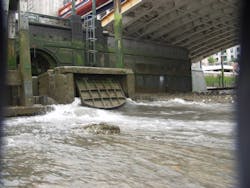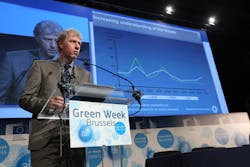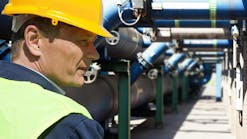The gap between how much water costs to get from source to tap and how much it is priced is vast and doesn't seem to be closing. Utilities in Germany and Singapore charge more for water and claim this model is sustainable. Elsewhere water continues to be free. A look at the latest developments and how utilities globally are handling this controversial issue.
By Jeremy Josephs
Six months ago it might have been hard to believe that utility prices - the amount we pay for our water, gas and electricity services – would be top of the political agenda today. Yet this is precisely what has happened. British, French and German leaders are regularly making pledges on tariff reform or in respect of the cost of living.
In the UK it would appear that the energy companies have been heavily criticised recently, being hauled regularly before parliamentary Select Committees. During his keynote speech to the Labour Party conference, leader of the opposition Ed Miliband made it clear that he wanted to 'press the reset button' by imposing a 20-month price freeze to 2017 on all energy companies.
Water companies may have been excluded from the prospective price freeze but many commentators have questioned whether they might not be next. Why? Because every one of Britain's water companies has increased bills for householders faster than the rate of inflation for the last ten years.
For example, water companies hiked bills by an average 3.5% in 2013 with the average cost of a water and sewerage bill now running at just under £400 a year. Regional variations remain significant: customers in the South East saw their bills rise by £23 a year while families in the South West found themselves £40 a year better off.
For the UK regulator, Ofwat, there is an extremely delicate balancing act to be performed, as Regina Finn, its former chief executive, explained shortly before her resignation last year: "We understand that there is huge pressure on household incomes, and any rise is clearly unwelcome. But inflation is driving these increases which will help pay for investment of around £1,000 for every household in England and Wales."
Thames Water, the UK's largest water and wastewater services company, which supplies 2.5 gigalitres of drinking water on a daily basis and whose customers comprise over a quarter of the UK's population, has found itself at the sharp end of this investment/prices balancing act. This has been in respect of the Thames Tideway project - a proposed 25 km tunnel running under the River Thames through central London and intended to provide the storage and conveyance of combined raw sewage and rainwater discharges that currently overflow into the river.
Speaking to WWi magazine, Thames Water chief executive Martin Baggs says: "It's a huge 'must-do' project to stop tens of millions of tonnes a year of sewage entering the tidal River Thames.
"But we recognise that affordability is a significant problem. So for customers genuinely struggling to pay their bills, we can and will do more to help. We are increasing the number of ways in which we will assist this year, bringing in important measures which were originally planned for 2015 and beyond."
Labelled the "super sewer", the project could mean annual family bills going up by the equivalent of 11% above inflation, from an average of £358 to £398 by 2020 to fund the massive £2.8 billion investment.
Meanwhile, Ofwat recently turned down Thames Water's request for a £29 one-off increase in bills, in part to pay for the rising costs of Tideway Tunnel project. This has been seen as a rare flexing of its statutory muscles and an apparent rebuke to its many critics who regularly accuse it of not being strict enough.
Fixing a fair tariff for water and sanitation services does indeed incorporate elements of politics, philosophy and economics alike. And raises the question of what is "fair"? Fair to one family might not be to another with a lower household income. Is water a basic human right or rather a commercial product? If the former, should it not be free? If the latter, should market forces not prevail?
It is precisely because these politically-poised questions have never been answered with any degree of clarity that water tariffs vary so greatly, not just in Europe but around the world.
In fact Dr Vivian Balakristnen, Singapore's minister for the environment and water resources, made it very clear during an interview with WWi magazine in China that when it comes to water pricing the issue is political rather than economic in nature.
"Remember that the pricing of water is not a technical question – it's a political question," he said. "The challenge is for political leaders to convince people that whilst water is of course an essential element - that we also have to price it right in order firstly to promote water conservation and to ensure that the companies who do come in to the market do so with the latest technology and produce good clean water which is safe enough to drink.
"This will give an assurance that there will be sufficient funds in the long-term for the deployment of such technology. So without getting the pricing of water right - both water conservation and future investments in infrastructure will always be under pressure."
Moving back to Europe and Ireland specifically, according to the Dublin Statement of Water and Sustainable Development (1992) "water has an economic value in all its competing uses and should be recognized as an economic good. But within this principle, it is vital to recognize first the basic right of all human beings to have access to clean water and sanitation at an affordable price."
Until recently, municipal water in Ireland was free, no matter how much you used. Without metres or water bills, there was no way of even knowing how much you used on the not unreasonable grounds that there were no water meters and no water bills. An aquatic paradise? Hardly - the Irish economy had well documented problems, later having to be bailed out by the European Union.
And part of the bailout package was transferring responsibility for water services provision from local authorities not just to a new water utility but to introduce domestic water charges too.
For the last half century France has taken precisely the opposite approach - in fact 'free' water is illegal - the guiding principle being that 'water pays for water', meaning that there is little state intervention in the provision of water. This in turn has meant that water and sanitation tariffs vary substantially from one service provider to the other.
Given the variety of pricing structures in place across Europe, it is difficult get an objective overview of water pricing. The approach of market reports from GWI over the years has therefore been to take the cost based on fixed costs and a consumption of 15,000 litres per person per month and then to divide by 15 to give a price per 1,000 litres. The resulting variety of average charges is surprising, to put it mildly. Whereas Italy's Milan notches up average charges of 0.40 euros, London registers at 1.63, Paris 2.16, Copenhagen 3.28 and Gent, in Belgium, a massive 5.75.
The respected German language financial newspaper Handelsblatt reports that Germany's water charges are the second-highest in Europe. An average charge of 5.34 euros per cubic metre lags only behind Denmark's 6.19.
It's the city of Potsdam that has Germany's highest water costs at 6.28 euros, although the German nation has succeeded in reducing their daily water usage per head by 18% to 121 litres since 1990. But these charges are nevertheless considered to be so high - they are maintained by public authorities who control 92% of Germany's water market - that private operators are being driven out of the market.
Jean-Marc Boursier, Suez Environnement's CEO has said that he is reducing Suez's operations in Germany as a result - with arch-rival Veolia Environnement doing likewise by selling its 25% stake in water operations in the city of Berlin.
With prices fluctuating wildly from one city to another in Europe, it is perhaps as well that the European Environment Agency (EEA) has stepped in with a report whose central theme is that flat-free water charges, where users pay a fee regardless of the volume used, do not encourage efficient behaviour either in households or agriculture. On the contrary, the report argues, water should be priced at a level which both encourages efficient use and properly reflects its cost.
As Hans Bruyninckx, the EEA executive director puts it in the preamble to his recent report: "In many parts of Europe, profligate water use is a real problem. However, there is a lot of potential for Europe to cut water use by improving efficiency. Charging water users for the volume of water they actually use, at a price reflecting the true cost, sends an important signal - freshwater is a limited and precious resource."
The Water Framework Directive called for Member States to create incentives for efficient water use by 2010 but it seems manifestly clear that this has not taken place. In Spain, for example, where some regions are severely water-stressed, agricultural water prices recover less than half of the cost, which of course leads to the inefficient use of water. And yet a 2012 Eurobarometer survey revealed that the public actually supports being charged according to the volume of water they use - even though flat-fee water charges remain common in parts of Europe.
Clearly the days of free water, as in Ireland's case, have gone. Yet treating water as a precious resource that needs to be paid for at full cost? Clearly those days have yet to arrive.
Jeremy Josephs is freelance contributor to WWi magazine. For more information, email: [email protected]





